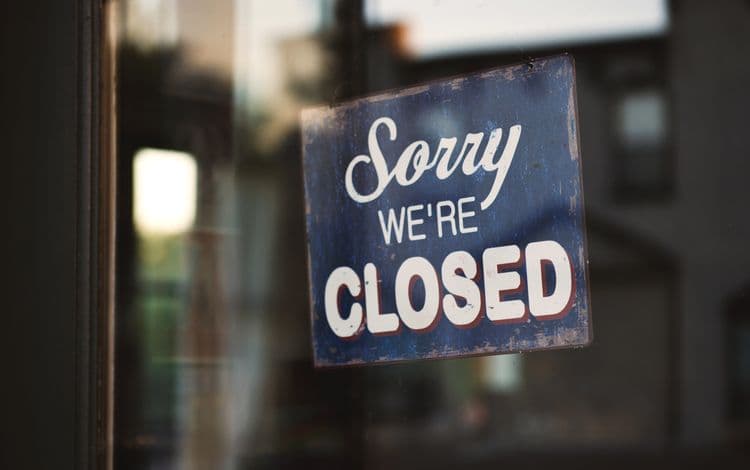In the wake of what has gone on in the first half of 2020, numerous big businesses are filing for bankruptcy. Given the economic crisis we face, this is not unexpected sadly. More under the radar, however, is the fact that small US businesses are disappearing by the droves post-pandemic. People just aren't aware of how dire the situation is. Given especially that small companies represent the backbone of the nation's economy, this could ultimately lead to an even grimmer financial picture overall.
Why is the disappearance of small businesses not garnering more notice? Experts cite the fact that the data simply isn't there. That is to say, with the bigger companies, we are cognizant of the fact that they are declaring bankruptcy. Their massive debt is well documented. However, with small firms, they often have no debt—or at least, no major debt—and so they end up quietly closing because they cannot bring in enough revenue to survive. For those companies, closing up shop is probably as easy as phoning the utility companies, disconnecting their electric and locking their door for good.
The economic situation is disastrous, to say the least. And small businesses are indeed bearing the brunt of the problems we are facing as a nation. Yelp.com reported that between March and July more than 80k businesses were permanently closed, according to status updates. And more than 60k of those were local, small businesses with less than five locations. According to the American Bankruptcy Institute, the number of small business bankruptcies when all is said and done by year's end will likely be up near forty percent from where that number was last year.
Sure, the closing of these smaller businesses is catastrophic for local communities and towns. Taken collectively, however, the failures of these companies could be a major blow to the economy. Think about it…currently companies with less than 500 employees makeup roughly 45% of US economic activity—this is based on a recent SBA report. They also employ nearly half of all US workers. Take tens of thousands of businesses out of the equation and we are looking at a picture that is not very pretty, and that is putting it mildly.
No Help on the Horizon
Look at Justine Bacon for example. Her studio, Yoga Brain, was forced to shut its doors at the end of June. A Philly based business, Yoga Brain did not bother to go ahead and try and file for bankruptcy. She just quietly closed up shop and hung the 'out of business' sign up. Bacon wanted to at least have some money left. Closing sooner rather than later, she was able to walk away with some savings in her account.
While Chapter 11 bankruptcy does help protect a business against creditors long enough to work out a comeback plan, for those smaller companies out there struggling with the day to day, having time to figure out the next step just isn't enough in this current climate. Not to mention, with smaller businesses, when declaring bankruptcy, odds are for protection purposes many would have to declare personal bankruptcy as well. This will effectively destroy their credit and if they ever did want to try and rebuild, such would likely be a long way off.
Those companies that do file for Chapter 11 have a 25% less chance of qualifying for a business loan should they ever need one. A bankruptcy depending on the circumstances can show up on your credit report for at least ten years in some instances.
New Lotus Moon owner Rebecca Schner feared this very thing. Her jewelry business in Texas was finally starting to break even at the beginning of 2020. Then of course the pandemic engulfed the nation. Scheer's sales dropped; she was unable to afford the business's rent any longer. She closed up the shop in May, let go of all employees, and is still paying back almost fifty thousand in loans. Had she gone the bankruptcy route, Schner was nervous that she'd never been able to qualify for another loan. Her idea is to potentially start a mobile boutique and will eventually need a vehicle loan.
As it is, small businesses have a tough enough time making a go of it in a non-pandemic climate. According to statistics only about half of all small companies survive their first five years. Given the events of 2020, near sixty percent of American small business owners are worried that they may have to close for good—even those who've been around a decade or more.
In June of this year, a survey uncovered that over thirty percent of owners reported their lowest sales ever. Only seven percent said that sales were higher than this time last year. Restaurant owners, Jose Gamiz and Leticia Gamiz closed their Glendale, Arizona establishment in July. The bills were too much with barely any money coming in. They were paying four employees and simply could not keep up with payroll, rent, and overhead in general. For them, staying open could mean losing their house if the business bottomed out. It was a gamble they were not willing to take. In their eyes, it was better to let the restaurant go versus losing everything.
These stories are not uncommon. And that is the problem, so many are quietly closing up shop…the results remain to be felt.
First Union Lending can help. If you're in a position in which you need additional capital to make it through, we have fast and flexible loan programs designed specifically for small business owners. Some have the money in their account within two business days. Even if your credit score isn't where you want it to be, we likely still have a funding solution for you. With short term loans and lines of credit, among other such products, we can meet your needs with a custom-tailored loan. Call today and let's get started!
